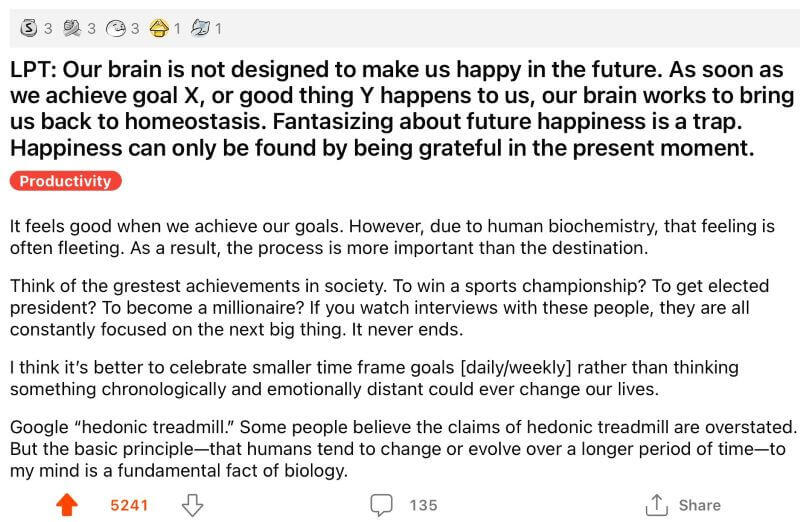
For some, their twenties are enshrined as the glory days of their life, whereas the legacy for others is more nuanced. In either case, there are plenty of lessons to be learned. I am not yet 30, but I’m close, and my twenties have not been a bed of roses or victory parade. That said, I am grateful for every person I have met and experience I have made, both good and bad, because they have made me who I am today.
Without further ado, here are the top 10 life lessons I learned in my twenties! I made this write-up for myself and later adapted it into an article.
1. Happiness is a daily choice, not a future destination.
How often do we tell ourselves “I will be happy when x happens.†Or “I will be happy when I achieve y goal.†However, it’s rare for singular events to change our lives in a dramatic fashion. Typically, once we achieve one goal we craft new, more advanced ones soon after that. Goals keep us disciplined and it feels good when we accomplish them. But the goalposts are constantly moving, and so the journey will always outweigh the destination.

2. Isolation is an enemy of the soul.
Due to technological innovation, we are more functionally independent than ever before. We don’t need to cooperate with as many people as in the past to meet our basic needs for food, water, clothing, shelter, and safety. However, our emotional health continues to depend on the connections we form with people. The mental health crisis of 2020 brought about by mass social alienation is an extreme example. Don’t isolate just because it’s convenient. And continue to reach out, even when it hurts.
3. Balance is a key to life.
I have an extreme personality and am always taking things to their logical conclusion. This was true for me with exercise, fasting, meditation, my academic studies, and anything else I put my mind to. However, I learned through failure that balance is the way of nature, and that too much of one thing, or not enough of another, is a detriment. For example, a mineral deficiency due to an imbalanced diet can debilitate the entire organism, as can too much of any one rigorous activity. In order to achieve balance, we must listen to our bodies and heed the wisdom of people whose experience exceeds our own.
4. Gratitude is a currency of joy.
Most of us are better at identifying the pain others cause us than the good they bring to our lives. The truth is that people we never met made our lives much easier through the struggles and innovations they contributed to the world. More often than not, they were acting in their own self-interest, but we all benefited as recipients of “common grace.” Let alone the personal good our parents, teachers, coaches, and friends do us on a regular basis! Everyone appreciates gratitude, and for some, gratitude is the fuel that sustains their existence. It takes very little to say thank you, and just a small bit more to show gratitude in more memorable ways (e.g. a gift, a letter, an artwork etc.)
Entitlement is the enemy of gratitude, because it sees the good we receive as a right, rather than a privilege. In reality, God and people don’t owe us anything. And many people lack the things that we take for granted every day.
Entitlement deprives both the entitled and the people around them from the gift and joy of gratitude.
Walk In Integrity
See The Power Of Gratitude (Gary Vee).
5. There is no shortage of hardship in the world.
There is a saying, “Be kind because everyone you meet is fighting a battle you know nothing about.” It is easy to become preoccupied with our own thoughts and struggles such that we lose sight of this fact. However, the more we get to know others, the more we realize that everyone has battles no matter how much they seem to have it together on the outside. Immersing ourselves in this reality puts our problems in perspective and creates opportunities for us to use our gifts to help others.
“The pain will leave you once it has finished teaching you.” (Bruce Lee)
Bruce Lee
6. Life is too short for “the two deadly R’s” –resentment and regret.
Numerous ancient folktales trumpet the wisdom of “this too shall pass.” Good moments don’t last and neither do bad ones; the only thing that remains is our memory of them. And our memory depends in some part on how we interpret our experiences. Resentment and regret result from an interpretation of our experiences that lacks compassion (see #7). They are blockages that keep us from growing and limit the potential of new experiences to transform us. While emotions pass, the lessons we learn from them stay with us the rest of our lives. Choosing to focus on that instead of the pain is the essence of growth mindset.
7. Nobody can act beyond their current level of consciousness.
Much human struggle comes from a lack of understanding and kindness on the part of others. That struggle is compounded when we become resentful of how people treat us, be they family members, friends, acquaintances, or enemies. While people are conscious and capable of reason, they have a finite nature that manifests itself time and again. Human nature owes to biology, but also to environmental factors. Just as we wouldn’t get mad at a rock for being hard, we should not get mad at someone for acting the way they do. There is a real sense in which they can’t help it!
When you wake up in the morning, tell yourself: The people I deal with today
The Meditations of Marcus Aurelius
will be meddling, ungrateful, arrogant, dishonest, jealous and surly. They are like this because they cannot tell good from evil.
In the same way, regret is the desire to have had more knowledge, wisdom, or power at some point in the past. Lesson #7 — that no one can act beyond their current level of unconsciousness — applies as much to ourselves as others. This insight is an antidote to regret for past mistakes and omissions and should keep us from becoming resentful of others.
8. Do not seek a material solution to a relational problem, and vice-versa.
Mommy issues, daddy issues, rejection issues, and self-esteem issues will not be solved by good diet, exercise, fasting, discipline, hobby, or work. All of these things are important and create an environment conducive to healing. However, we need to address root causes if we want to heal. Discipline alone cannot heal a broken heart, neither can success in an endeavor. In the same way, dietary and health issues that stem from lifestyle choices cannot be solved apart from lifestyle changes.
9. People tend to appreciate the love we show.
Some people are ungrateful and don’t know the difference between good and evil. Yet most people do, and rarely will we ever encounter someone who is totally impervious to goodness. If we want to build a relationship with someone or make a difference in their lives, #9 is a good place to start. Even if people don’t appreciate our kindness, it grows our character, and so no good deed is ever lost.
In the same way, let your light shine before others, that they may see your good deeds and glorify your Father in heaven.
Matthew 5:16
10. It’s never too late to get it right.
It is common to wish we “knew then what we know now†or wish we had acted differently in the past (regret). However, time continues to move forward. In a year from now, will we have the same old regrets, or will we have created new memories and experiences that bring us satisfaction? Regret is a passive emotion, whereas action produces change and can bring us closer to where we want to be in life.







